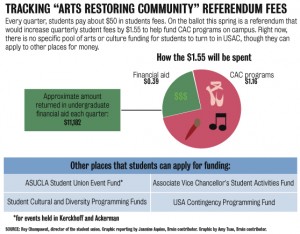A referendum on the undergraduate student government election ballot aims to use a student fee increase to create a specific pool of funds for cultural and arts-related programs.
Though students can currently apply for funding for arts programs through different sources on campus, there is currently no clear fund dedicated to student art programs.
By raising quarterly student fees by $1.55 per student, the “Arts Restoring Community” referendum would create an extra funding source for campus student groups’ cultural and arts-related programs, providing about $40,000 more every quarter for the Undergraduate Students Association Council Cultural Affairs Commission to allocate. The referendum needs a majority of votes to pass. 
The fee would not apply during summer quarter and would be adjusted in line with inflation, in step with the Los Angeles County’s Consumer Price Index, every academic year.
If the referendum passes by a majority vote, 25 percent of the fee would be returned to students in the form of financial aid each quarter, as dictated by university policy.
The USAC CAC and the Social Awareness Network for Activism through Art, an organization that addresses social issues through artistic expression, drafted the referendum amid financial struggles for students holding cultural and arts programs.
Student groups can currently apply to different funding sources, such as the USA Contingency Programming Fund, or the ASUCLA Student Union Event Fund if they are holding an event in Ackerman Union or Kerckhoff Hall.
But the amount of money available in these funding sources varies on a yearly basis depending on the amount of USAC surplus and the number of enrolled students, among other factors.
Student groups also have the option of applying for funds from the Associate Vice Chancellor’s Student Activities Fund, but it supports a wide variety of on-campus programs and could cease to exist if administrators chose to stop funding it.
Roy Champawat, the director of the Student Union, said he has seen a spike in groups that need funding since he started working at UCLA.
“I believe what I’ve seen is more desire to express and engage from the student body,” Champawat said.
In the past year, the CAC has had to allocate less funds to the Cultural Programming Mini Fund, another source of money for student groups that promote cultural awareness or diversity.
The commission typically deposits an additional $4,000 to $5,000 each year in the fund but, because of other programming costs, it did not receive additional surplus funding this year.
Some student group members expressed their frustrations regarding the scarcity of funds for programming events this year.
Suzanna Tran, a producer for this year’s Vietnamese Student Union’s culture night, said that more stable funds could have helped alleviate some of the group’s financial concerns.
If the referendum passes, any on-campus student groups would have access to the funds as long as their programs educate students about arts or culture-related topics.
MEDLIFE, a global health organization that gives students hands-on experience alongside physicians, recently put on a global heath symposium that would have qualified. Though the group initially had some financial concerns, members said they were able to alleviate some costs by opting for a cheaper catering option and less incentives, said Ilana Greenberg, a first-year undeclared life sciences student and a co-organizer of the event.
She said that even if extra funding was available, she would not have applied for it because most programs are co-hosted or can be altered to spend less money.
Some students said they do not want to pay more money without knowing exactly how it will be spent.
“There are already so many student fees that go to other funds to help these groups,” said first-year biology student Maria Gonzalez.
Gonzalez added that groups should aim to be more self-sufficient and learn to be more environmentally friendly to save money.
Students can cast their votes on the referendum online through MyUCLA until noon on Friday.